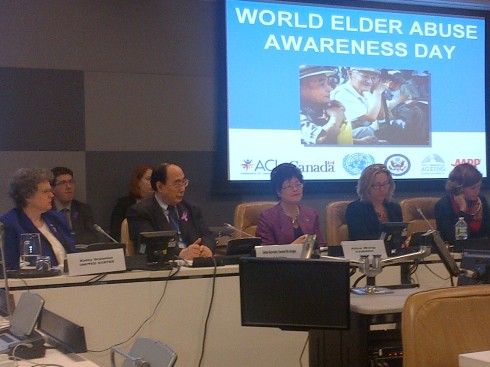Information
Prior Content
Search
Links
Canada taking action to address elder abuse
New York, New York, June 14, 2013—The Honourable Alice Wong, Minister of State (Seniors), was a keynote speaker today at a special event held at the United Nations headquarters to mark World Elder Abuse Awareness Day, which is on June 15. Minister of State Wong spoke about the measures that Canada has taken to combat elder abuse, as well as the importance of raising awareness about the issue.
“Our Government is committed to standing up for victims of elder abuse,” said Minister of State Wong. “In support of World Elder Abuse Awareness Day, we are pleased to recognize the work being done to raise awareness of elder abuse and help enable seniors protect themselves from its many forms, including financial abuse.”
World Elder Abuse Awareness Day brings attention to the abuse and neglect that some older adults experience and how abuse can be prevented. The governments of Canada and the United States partnered with the United Nations to jointly host the recognition event, which consisted of two sessions. An international perspectives session included speakers from the United States, Canada, the European Union and Malawi. It was followed by a non-government organization discussion and networking session.
The Government of Canada helps to address elder abuse through awareness campaigns, the New Horizons for Seniors Program (NHSP) and legislation. The NHSP provides funding for projects that raise awareness about elder abuse and create resources to help seniors protect themselves. In January 2013, the Protecting Canada’s Seniors Act was adopted, ensuring stronger penalties for offences involving the abuse of elderly people. Through Economic Action Plan 2013, the Government proposes to better safeguard the well-being of seniors in a variety of areas, including financial services, financial literacy and health.
Elder abuse is a hidden crime that can take many forms, including physical, financial or emotional. In Canada, it has been estimated that between 4 and 10 percent of seniors experience some form of abuse, and that only one in five cases of abuse is reported.
Visit seniors.gc.ca for information on the signs and symptoms of elder abuse, as well as resources for preventative action.
Backgrounder
The Government of Canada is working hard to help improve the lives of seniors on many fronts. These efforts include:
- developing seniors.gc.ca as a central resource for seniors on government benefits and services, including finances, housing, health and wellness;
- providing Canadians with close to $76 billion this year through Canada’s public pension system;
- implementing a top-up to the Guaranteed Income Supplement (GIS) to help Canada’s most vulnerable seniors. This was the largest increase in 25 years to the GIS for the lowest-income seniors. This measure further improves the financial security and well-being of more than 680 000 seniors across Canada;
- providing $2.7 billion in 2013 in additional tax relief to seniors and pensioners through measures such as pension income splitting and increasing the Age credit;
- providing $400 million over two years under Canada’s Economic Action Plan for the construction of housing units for low-income seniors;
- taking action to address elder abuse, including awareness campaigns, the New Horizons for Seniors Program (NHSP), which funds projects to raise awareness of elder abuse, and legislation that would help ensure consistently tough penalties for offences involving the abuse of elderly persons;
- increasing funding to the NHSP by $5 million, bringing the Program’s annual budget to $45 million. The Program helps seniors use their leadership abilities, energy and skills to benefit communities across Canada; and
- supporting positive and active aging through the collaborative Age-Friendly Communities Initiative, Physical Activity Tips for Older Adults and falls-prevention initiatives.
